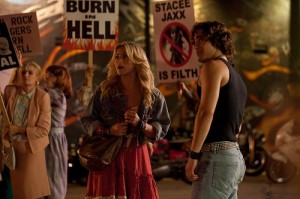Black Nativity
Posted on November 26, 2013 at 5:00 pm
B+| Lowest Recommended Age: | Middle School |
| MPAA Rating: | Rated PG for thematic material, language, and a menacing situation |
| Profanity: | Some strong language |
| Alcohol/ Drugs: | References to substance abuse |
| Violence/ Scariness: | Teenager threatens someone with a gun, references to violence |
| Diversity Issues: | A theme of the movie |
| Date Released to Theaters: | November 27, 2013 |
 The poet Langston Hughes wrote a play called “Black Nativity,” a joyous African-American retelling of the story of the birth of Jesus with gospel music, and it has become a holiday perennial. Now it has been adapted by writer/director Kasi Lemmons (“Eve’s Bayou”) with a framing present-day story of a prodigal daughter, estranged from her parents for 16 years, brought back home at Christmas as “Black Nativity” is being performed in her father’s church.
The poet Langston Hughes wrote a play called “Black Nativity,” a joyous African-American retelling of the story of the birth of Jesus with gospel music, and it has become a holiday perennial. Now it has been adapted by writer/director Kasi Lemmons (“Eve’s Bayou”) with a framing present-day story of a prodigal daughter, estranged from her parents for 16 years, brought back home at Christmas as “Black Nativity” is being performed in her father’s church.
Oscar-winner Jennifer Hudson plays Naima, a single mother in Baltimore who has lost her job and is trying everything she can think of to keep her home. But even with two jobs, she and her 15-year-old son Langston (17-year-old Jacob Latimore), named for the poet, are about to be evicted. Niama has no other options left. She puts Langston on a bus to New York to see the grandparents he has never met, knowing nothing about them or the cause of their estrangement.
Langston is hurt, lost, and angry. He is frustrated that he cannot do more to help his mother and determined to find a way to get her the money she needs to keep their home. Things go badly when his bag is taken by a kid as soon as he gets off the bus and he is arrested trying to return a man’s wallet because the police think he is trying to steal it. In jail, he meets Loot (Tyrese Gibson), who jeeringly calls him “Lunch Money” and makes Langston feel powerless and disrespected.
His grandfather, Reverend Cornell Cobbs (Forest Whitaker), is formal and reserved. His grandmother, Aretha (Angela Bassett) is affectionate but clearly in pain over the past and afraid of being hurt again. Langston will do anything to feel that he is taking control of what is happening to him so he can return home.
Impressionistically told, with songs that serve as monologues, the movie becomes more powerful when Cornell’s church stages a gorgeous production of “Black Nativity” and Langston nods off to have a gospel-inspired dream that features Nas and, as an angel with white hair sticking up like a dandelion ready to make a wish, Mary J. Blige. When Langston sneaks out of the service in a desperate attempt to get the money, it leads to a confrontation revealing in ways he could not anticipate. The concluding scenes of redemption and reunion are tender and transcendent.
Parents should know that the storyline concerns foreclosure and eviction, family estrangement, law-breaking, teen pregnancy, and abandonment. A teenager uses a gun.
Family discussion: Why didn’t Langston’s family want to tell him the truth? What did the watch symbolize to Cornell? What did we learn from Langston’s dream?
If you like this, try: the poetry of Langston Hughes

